
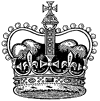
![]()
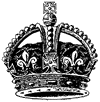 of an arch,
including the keystone;
also, an open finial of a tower.
of an arch,
including the keystone;
also, an open finial of a tower.
Or, the headpiece signifying office, often of a king or queen.
Examples of crowns:
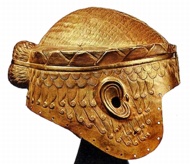
Mesopotamia, Royal Cemetery at Ur, Gold Helmet of King Meskalamdug, c. 2400 BCE, repoussé gold, height 22 cm, greatest diameter 26 cm. The decoration of the helmet simulates the king's crown, hair, and ears. Holes drilled along the lower edges enabled the attachment of an inner helmet. This is one of many Mesopotamian objects that have recently been lost or stolen from Iraq's museums and have yet to be recovered. The Oriental Institute of the U of Chicago has posted a database of treasures that have been lost or stolen from Iraq. See arms and armor.

A crown of thorns in Christian iconography
refers to Christ's passion. The one shown here is combined with
three nails — further symbolizing
Christ's death on a cross. This image was drawn after
a nineteenth century stained
glass window.
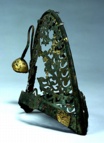
Japan, Kofun
Period, 5th-6th century, Crown, gilt
bronze, excavated
from Funayama Tumulus, Kikusui-machi, Kumamoto, lower length
14.6 cm, height 16.5 cm,
Tokyo National Museum. Considered by Japanese authorities "National
Treasure." See Japanese
art.
![]()

German, The Imperial Crown, Western Germany,
10th-11th centuries, gold,
cloisonné enamel,
precious gem stones, pearls,
red velvet; brow plate: 14.9 x 11.2 cm; cross: height
9.9 cm, Kunsthistoriches Museum, Vienna.
![]()

![]()

![]()
English,
"The Armada Portrait" of Queen Elizabeth
I
(reigned 1558-1603), oil on canvas, Woburn Abbey.
![]()
A detail of this painting shows the queen's crown.

Jan Vermeyen (Antwerp), The Crown of Rudolf II, later Crown of the Austrian
Empire, 1602, gold,
partially enameled,
diamonds, rubies, spinel rubies, sapphire, pearls, velvet, height 28.3 cm, circlet 22.4
cm in diameter (with pearls),
largest span (over the fleurs-de-lis on the brow and neck) 27.8
cm, Kunsthistoriches Museum, Vienna. See gem.
![]()
![]()
![]()
Ottoman Turkish, c. 1600, The Crown of István Bocskay, who
reigned briefly over Transylvania, gold, rubies, spinels, emeralds, turquoises,
pearls, silk, height 23.2
cm, diameter 18.8 - 22
cm, Kunsthistoriches Museum, Vienna.

Évrard and Frédéric Bapst (French jewelers, Paris), Crown of the Duchess of Angoulême,
1819-1820,
40 emeralds, 1031 diamonds, gold, gilded silver, Louvre.
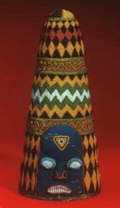
Nigeria, Yoruba, Beaded Crown, 20th century, glass beads and grass cloth, height 20 3/8 inches (51.7 cm), North Carolina Art Museum, Raleigh. See African art.

Moshe Zabari (Israeli, 1935-), Torah Crown, New York, 1959, raised
and forged silver, pearls, The Jewish Museum, NY. "This
unusual Torah ornament combines both the traditional
finials (rimmonim) and crown into
a single hybrid work fabricated of silver and pearls. When carried in procession, the pearls
shake and the silver arcs quiver to create movement and sound,
like a kinetic sculpture." See curvilinear
and Jewish art.
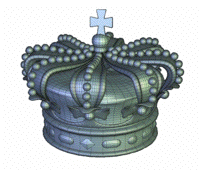
Royal Crown, 2003?, digital
image, showing a wireframe with a NURB surface, produced with 3D modeling graphics software "Amapi Designer 7" from eovia.com.
Also see finial, jewelry, gem, harmika, masterpiece, pendant, and tower.
https://inform.quest/_art
Copyright © 1996-![]()